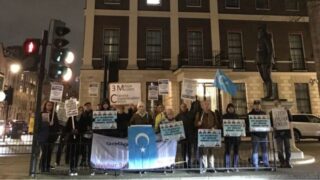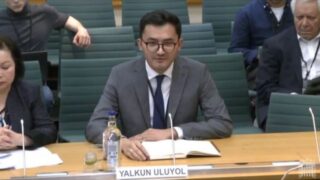An author who tried to create a national Uyghur conscience through poetry and education was executed by a Chinese warlord ninety years ago.
by Abdurehim Gheni Uyghur


Yesterday, March 13th, Uyghurs throughout the world remembered the 90th anniversary of the death of Abduxaliq Uyghur, a well-known Uyghur poet who was tragically beheaded by the Sheng Shicai government in 1933. The poet devoted his life to the freedom of the Uyghur people.
Abduxaliq Uyghur was born on February 9, 1901, in Turfan, the ancient capital of the Idikut Uyghur dynasty that ruled the region from 848 to 1369 CE. Abduxaliq Uyghur was the scion of a well-educated family. He was already literate by the age of 5, and at 12 he began attending a religious school, where he learned Arabic and Persian, and was exposed to classical poets as well.
In 1916, he accompanied his grandfather, Mijid Haji, to Russia for business, and took the opportunity to learn Russian. Upon his return to Turfan, he attended a Chinese school, where he learned the language and gained a certain knowledge of Chinese classical and modern literature. It was at that point in his life that he decided to fight against ignorance and to devote his efforts toward reforming the Uyghur society through science-based knowledge.
In 1923, Abduxaliq Uyghur travelled to Russia, now part of the Soviet Union, for the second time, along with the famous Uyghur reform pioneer Mehsud Muhiti. For three years, he studied and researched in different fields of science. During this period, he had chance to read the works of Pushkin, Tolstoy, and Gorky. The political situation following the Russian October Revolution affected him tremendously.
Upon returning from Russia in 1926, he started initiating the educational reform known as “New Education.” He established a publishing house, and printed and distributed newspapers and journals. His activities immediately faced restrictions by the nominal governor of the region, Chinese warlord Sheng Shicai. However, Abduxaliq never stopped his activities. With the collaboration of his friends and fellow reformists, he established a Uyghur education fund, which enabled him to open a “New School” in the town of Yingi Sheher the following year. Soon after that, he followed up with another school in the town of Kuwuk, and one in Turfan a year later.
During these years, Abduxaliq Uyghur authored revolutionary poems that awakened the Uyghur people in the region, at the same time raising concerns among the Chinese warlords. The colonial government banned his poetry, and people were forbidden to read them. In November 1932, Abduxaliq Uyghur wrote his most revolutionary poems, “Oyghan” and “Gul Achil” in Uyghur language on white cloth, and hung them on the streets, urging Uyghurs to oppose the brutality of the Chinese colonial invaders.
Early in December 1932, Uyghur farmers in Turfan and Kumul started armed uprisings against Chinese invaders, calling for an end of the years of Chinese brutal oppression in the Uyghur homeland.


Sheng Shicai, who is remembered as a ruthless killer of Uyghurs, went to Kumul to silence the uprising, but failed in the armed confrontation. On his retreat to Urumqi, he arrested Abduxaliq Uyghur and his friends with the aid of a traitor named Rozi Mullah. On March 13, 1933, the patriotic poet Abduxaliq Uyghur, at the young age of 32, was brutally beheaded by Sheng Shicai along with seventeen others on the streets of Turfan. Right before his death, even when the sword was at his neck, Abduxaliq Uyghur stood high and shouted anti-Chinese slogans in Chinese and Russian: “Freedom !!!”, “Independence !!!”
To this day, the poet’s blood-soaked, soul-provoking poem “Oyghan” (Awakening), and the poem dedicated to liberation “Gul Achil” (Bloom My Flower) remain a part of the pride, national conscience, and inspirational support for the Uyghur people.









